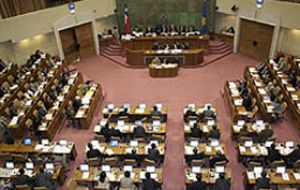MercoPress. South Atlantic News Agency
Chilean Senate approves reforms to controversial anti-terrorism law
 The Mapuche hunger-strike, on its 82nd day, is at the heart of the dispute
The Mapuche hunger-strike, on its 82nd day, is at the heart of the dispute Senate passed new reforms to the controversial anti-terrorism law this week, but they were not enough to end the Mapuche hunger strike, which enters its 82nd day today Friday.
The reforms lowered penalties for arson, eased measures taken against terrorism suspects, placed more penalties on those who finance terrorist crimes, and limited the use of anonymous witnesses. The reforms will become part of the law if they are approved by the Chamber of Deputies.
Dialogue between the government and the Mapuche representatives is on hold, after a dialogue table that began Sept. 23 produced little results and the government was unable to comply with the Mapuche’s request to meet with all three of its branches.
“When there is a desire for a conversation, the dialogue can continue,” said Rodrigo Curipan, a spokesperson for some of the hunger strikers. “The government has shown that it can’t do anything more. It’s not that we have broken off the dialogue with the executive branch, it’s that we also want the two other branches involved to look for solutions.”
Supreme Court President Milton Juica said that he would meet with representatives of the hunger strikers Friday to speak with them, but not to negotiate.
Interior Minister Rodrigo Hinzpeter is also expected to meet with Mapuche representatives on Friday in Temuco.
“We hope to offer to the country a solution for this problem, which has gone on for many days and has distressed millions of Chileans,” Hinzpeter said.
There have been various protests and marches in Chile in support of the hunger strikers, especially by university students. Protests in Temuco turned violent Wednesday, when protesters blocked roads into the city and were confronted by police. At least 20 people were arrested.
On Thursday, police detained 14 people for blocking a bridge in Valdivia in an attempt to raise awareness of the hunger strikers’ cause.
The anti-terrorism laws were first created during the dictatorship of Gen. Augusto Pinochet, but later employed by both the Ricardo Lagos and Michelle Bachelet governments in an effort to intimidate Mapuche activists.
The hunger strikers have all been arrested as terrorists for crimes ranging from armed assault to arson, carried out in a campaign to reclaim ancestral lands that were sold by the government without the Mapuche’s consent.
In addition to protesting the anti-terrorism laws, the hunger strike is also protesting the militarization of the Araucanía Region (IX), where most Mapuche live, and the police’s use of excessive force against the Mapuche people.
After various European nongovernmental organizations expressed concern over the current hunger strike, the European Parliament asked Carlos Appelgren Balbontin, Chile’s representative to the European Union, to explain the Chilean government’s actions that led to the hunger strike.
The European Parliament announced Thursday that it would send a delegation in November to Chile to investigate the situation of the Mapuche people.
By Kara Frantzich – Santiago Times




Top Comments
Disclaimer & comment rulesCommenting for this story is now closed.
If you have a Facebook account, become a fan and comment on our Facebook Page!